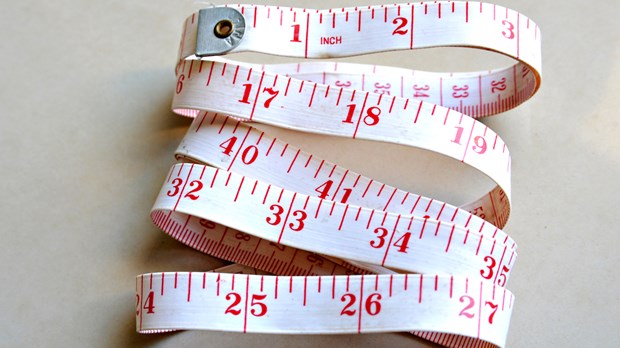The Unholy Weight of the Scale

It was the summer of 2004, and I was in the best shape of my life. I ran six miles a day, went to the gym, and ate tons of green leafy things. But it still happened: Just when I thought I was looking my best, I would always bump into a group of women who were skinnier, prettier, more talented, and smarter.
Then I would look in the mirror, and it would reveal even more horrors—horrors I somehow overlooked the last time.
Insert: more running, more broccoli, more discipline.
I was a hamster in a ball, working really hard and getting nowhere. My identity was wrapped up in external beauty. No matter how hard I tried, I couldn’t keep up. And chasing after culture’s expectations for beauty inevitably led to failure, disappointment, and insecurity.
Average Beginnings
Middle school was a weird-looking time for me. Plagued with freakishly pale skin and a set of fangs, I was “all Twilight” before vampires were cool. Afraid of rejection, I’d spend middle school dances hiding out in a bathroom stall with my stomach in knots. Middle school was also the first time I remember weighing myself. I learned in health class what, exactly, I should weigh for my height. For example, BMI charts might say that the average 5ʹ8ʺ small-framed female should weigh 128–139 pounds. That word—average—I hated it and all of its synonyms: usual, ordinary, standard, typical, normal, regular.
If the average girl my age and height weighed that number, I was determined to be extraordinarily below that number. Diet pills, excessive working out, and watching every calorie that went into my mouth absolutely consumed my thoughts. The scale was my master. The fear of being average, or ordinary, controlled my life.
From Middle School to Married Life
It doesn’t matter if you think you make the “hot list” or the “not list.” It doesn’t matter if you eat green smoothies every meal or if McDonald’s is your second home. It doesn’t matter if you are 18 or 68. Regardless of body size, most women, at some point in their lives, struggle with not feeling beautiful.
Before marriage, I was insecure about my microscopic spider veins and my hairy arms. One “I do,” nearly ten years, and three children later, my tendency is still to hide the things I don’t like. But now, I’ve got bigger problems than hairy arms and tiny veins.
Giving birth to three babies takes a toll on a woman’s body (one that is well worth it). Our last bundle of joy left a bundle of weight on my body—a whopping 60 extra pounds. Being 5ʹ11ʺ makes it is a little easier to hide the weight, but honey, nothing hides when you’re naked!
During the period of time after our third baby, I felt so fat and ugly that I just didn’t want to be touched. I realized that so much of my sexual desire was wrapped up in whether I felt desirable—which I didn’t. I also didn’t feel worthy of my husband’s affections.
Mirror Mirror
One thing I learned in this season was that you don’t have to feel desired in order to be desired. Most days when I pass by a mirror, I still look at it and think, Who stole my body?! Maybe you can relate.
Focusing on what we see in the mirror will always leave us longing for more because let’s face it: There will always be someone who seems prettier and skinnier, and we could always find something about our bodies that we think needs improvement.
So what should we do? While exercise is crucial for your mental and physical health, when it comes to judging what we see in the mirror, what we really need is a heart change.
Weighing In
When we weigh ourselves, we often do it in hopes of obtaining that magical number of perfection that exists in our heads. Sometimes, we become a slave to that number. We work with all of our might to maintain, to look good, and to prove our worth.
In truth, life is full of scales. They exist to tell us how we can become better, work harder, be prettier, and ultimately, have more value. We go through life constantly weighing in and asking, “Do I measure up?”
We weigh in at home, work, church, and on social media. Do I cook healthy enough? Is my home as clean as hers? Am I reading enough with my children? Is my sex life as exciting as theirs? Does my performance meet everyone’s expectations? Do I serve enough? Have I had enough “quiet times” this week? Are my children as intelligent and well-behaved as hers? Am I as feminine as I should be? Am I enough?
Weighing in becomes a roller coaster. Not in the fun way, but in the, “I just ate the entire funnel cake and lemon shakeup before I got on the Tilt-A-Whirl and things are about to get really messy” way. That number we want to achieve and the definition of perfection continually changes. The world’s expectations of women are constantly changing. Expectations are fickle.
If we find our identity in the scales of this world, we become either heavy with pride or crushed with the weight of our inadequacies. The pendulum continually swings. One day we are the “King of the World!” and the next day our ship has sunk like the Titanic. The problem is that while we have been looking at our performance, we should be looking to the performance of another.
Hidden in Christ
Our true identity is discovered through the lens of God’s Word. Here, in the finished work of Christ, our unworthiness is met with his unrelenting love. We must embrace the fact that life’s most important question for us is not “Who are we?” but “Whose are we?” And we belong to Christ.
The Bible teaches that we’re all fat with sin (Romans 3:23), and no amount of running around doing “good deeds” could work this load off. We were spiritually ugly from conception (Psalm 51:5), and no amount of self-righteous makeup could hide this blemish.
If it were not for Christ, we would have all stayed in this state—hiding, ugly, disgraced, and slaves. However, God, out of his great love for us, sent his Son to rescue us and release us from the heavy load we have been carrying (John 3:16). Jesus never sinned; he was a sacrifice without blemish. He was sacrificed on the altar of a cross for all of our ugliness.
When God looks at you, he sees Christ. You are hidden in his righteousness. Christ is beautiful, and when God looks at you, he sees his beauty. Yes, you are fully known and fully loved.
God doesn’t choose us because we’re beautiful. There’s nothing noteworthy or admirable about us that would draw God to us. Instead, Christ in his love was drawn to us because of our ugliness. Our sin drew him to our rescue, and our ugliness—that he redeems—leads to his glory. Jesus didn’t save us because we were beautiful; he saved us to make us beautiful.
Living out of this acceptance changes our attitude about our bodies. And living out of God’s acceptance keeps us from living for the acceptance of others. We should approach the world as confident women. We’re well-loved by a great God.
A woman who understands how much God loves her will be like a magnet to which other hurting women will be drawn. Living out of acceptance makes a woman far too beautiful to hide.
Annie Leigh Edwards is a wife to Jamus (who just so happens to be her pastor) and a mom to three kids. Blogger, speaker, and online health/fitness coach, you can find Annie on Twitter at @AnnieEdwards01, Facebook, or at her website AnnieLeigh.com.
Read more articles that highlight writing by Christian women at ChristianityToday.com/Women
 Read These Next
Read These Next

 Blessed Are the Compassionate, For They Will Be FatiguedKeep calm and keep caring
Blessed Are the Compassionate, For They Will Be FatiguedKeep calm and keep caring Missing My MomMy loss changed the way I feel about my daughters—forever.
Missing My MomMy loss changed the way I feel about my daughters—forever.
 The Real Meaning of ModestyHint: It's not about sexual temptation.
The Real Meaning of ModestyHint: It's not about sexual temptation.








 Homepage
Homepage